Don’t be fooled! Karl Marx isn’t a friend of liberty and the individual. His writings mesmerize you into thinking that he is. Yet, millions around the world love this guy.
The German Ideology and the Communist Manifesto provide the best insight into Marx’s views against individualism. Instead of seeing individuals as independent, Marx sees society as a class struggle for power. It is a clash between the Bourgeois versus the Proletariat.
Reading these documents, you will think what he says sounds so good. He doesn’t mention breadlines or gulags. But there is a caveat.
Reality is different from theory.
You must remember this term: “Dictatorship of the Proletariat”. Let’s go find out what all this means.
Overview of Marx
Karl Marx is a household name associated with “Communism”. Some people dedicate their whole lives to studying his writings. Many spin-offs of Marxism include:
- Leninism
- Trotskyism
- Marxist Feminism
None of these interpretations respect the individual in its current form. His ideologies support collectivism over individualism. And his supporters hate America’s founding principles of liberty and individual rights. As you will see later, many argue differently.
Marx hated capitalists.
During the mid-1840s, monarchs ruled Europe. France continued going through revolution after revolution. Modern industry developed needing new workers.
Capitalists transformed countries from small farming communities to industrial powerhouses. As a result, many workers moved to cities seeking new jobs. Factories produced many material conveniences Marx detested. He thought capitalism and society left the workers behind.
For comparison in today’s world, less than 2% of Americans farm. Efficiency and mechanized food production replaced American agrarian society. But workers adapted and learned other skills, which Marx failed to understand.
“Marx saw the world only through an economic lens.”
J. Liberty
Furthermore, Marx saw the world only through an economic lens. If you examine his works, they all related back to an economic worker’s class struggle.
In other words, individuals are not distinguished by their own merit. But their collective whole within a group- or class.
Marx recognized two main class struggles:
- The Bourgeois vs the Proletariat
- The Capitalists vs the Working Class
- The Elites vs the Peasants
To Marx, these evil capitalists hated humanity. The working class should overthrow the capitalists via violent revolution.
Times required drastic action. Working class European peasants needed the hope that Marx supposedly brought.
Summary of Marx’s Ideas
Let’s continue our story. I will give you an overview of his ideas.
Marx wrote for several newspapers during his life. His articles mimicked his “revolutionary ideas”:
- revolution and overthrow of European governments in current civil society
- class warfare
- worker alienation
- abolish private property
- visceral hatred for economic competition
- advocate of socialism leading to communism
I will explain many of these ideas throughout the post. They lead to a lack of individual freedom.
What happens when you have radical ideas encouraging a coup d’état?
Kings and the populous notice what you say. And the ones who disapprove of your message will shut you up. Many European governments and monarchies acted swiftly to silence Marx.
They banished him from the country leaving him no home. He often left on short notice with little money.
After moving many times, Marx settled in London living out the rest of his life.
If you’ve read some of my other posts, the United Kingdom helped start the individual rights movement.
Curious as to the historical roots of individualism? LEARN MORE as I take you on a journey in the timeline of individualism.
Isn’t it weird that Marx ended up there?
Marx wanted the state to control society. Yet, he settled in a country valuing freedom of speech. And he used his individual rights to lobby against liberty-minded political systems. How ironic!
Also, some Marxists will call him a humanist. They’ll say:
” He wanted the best for society.”
Marxist Sympathizer
I will tell you to look at the list above. Advocating against economic freedom and promoting 19th-century identity politics results in division. It doesn’t bring people together.
Marx is popular in many places today. But be warned!
Don’t be fooled by his history, charisma, and charm.
He hated history. He explained prior history as such.
“History is nothing but the succession of the separate generations, each of which exploits…”
Karl Marx- The German Ideology
Individual vs Individualism
Marxist sympathizers will say Marx valued the individual. That’s garbage. I will decipher between his version of the individual and his opposition to the political system of individualism.
Marx’s Version of the Individual
I will only give Marx credit for this one idea. In the German Ideology, he recognized individuals as the foundation for existence. He also mentioned individuals are social creatures. But that’s it.
“Human history is, of course, the existence of living individuals.”
Karl Marx- The German Ideology
Once you make a statement like that, your ideas must keep the individual at the forefront. But Marx’s ideas show different results.
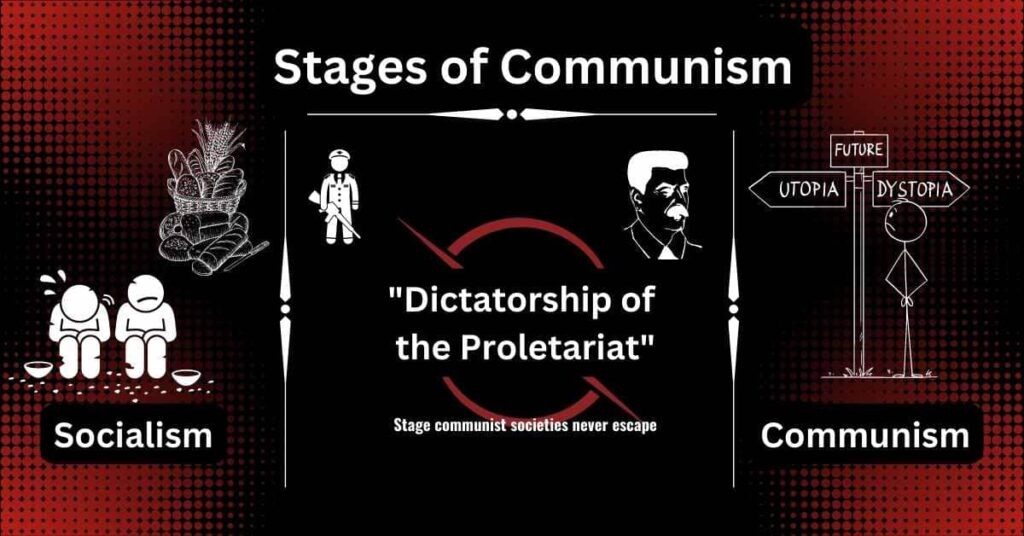
His master plan required submission in the “Dictatorship of the Proletariat”. In this phase of communism, the state seizes control of society.
Accordingly, you lose your individuality. Think about authoritarianism when you hear any word related to dictatorship.
George Orwell illustrates this point in his novel 1984.
Do you ever like your lose yourself? LEARN MORE because I give examples from Orwell’s 1984 on how you lose your individuality in autocratic regimes.
Also, Marx gained inspiration for his ideas somewhere, right? Hegel- an Enlightenment philosopher-gave Marx the motivation. But they differed in their approaches to altering society.
Hegel believed change came through individuals sharing ideas. People discussed and improved concepts over time.
You would exchange beliefs in the pubs and organizations of civil society. Look around you and you’ll observe civil society everywhere.
It is present walking down the streets and admiring the tall skyscrapers. You see it visiting parks and observing people basking in the sun.
Simply put, civil society is security and safety for people. It provides the rule of law and encourages the free exchange of ideas without an attacking lynch mob.
Furthermore, Marx wanted change faster. His version of civil society didn’t work for the class warfare he envisioned.
Citizens discussing ideas slowed the process of communist goals. The bourgeois needed to go.
According to Marx, civil society represented the interests of the bourgeoisie. They’re the ones who the world recognized as individuals.
“You must, therefore, confess that by ‘individual’ you mean no other person than the bourgeois, than the middle-class owner of property.”
Karl Marx- The Communist Manifesto
The working class lacked recognition. They belong to a class and are not identified as individual people. In other words, Marx saw them as victims of circumstances which they didn’t control.
Thinking like that doesn’t give you much motivation to escape your current situation. You’re hopeless without any way out but revolution.
And the communal class struggle needed to hype the revolutionary spirit.
“…individuals seek only their particular interest, which for them does not coincide with their communal interest…”
Karl Marx- The German Ideology
In the end, Marx believed the bourgeoisie to be the only individual in civil society. Others belonged to groups left behind.
Individualism- Self Interest
Individualism is a cultural and political system recognizing the individual as supreme.
Marx saw the constitutions of civil society as separating man from man. A society with individual rights atomizes citizens only for their self-interest.
Having self-interest outside your class disrupted the harmony of the collective. In an individualist world, people want autonomy to pursue what makes them happy.
To Marx, Individualism represented the devil. Because Marx viewed it as promoting capitalism. Remember, he saw the world only through an economic lens. Capitalism is an economic system.
What happens when people pursue their own interests?
It promotes competition. And competition leads manufacturers to produce more, more, more, and more…
The never-ending production saga leads to a term Marx called “historic materialism”. He believed people are always searching for the next best object to cure their sadness.
Thus, people couldn’t reach their true individuality in the current civil society.
The bourgeoisie controlled government and culture. Civilization represented only their interests and property- not everyone’s. Again, Marx wanted action now with no more discussion.
To destroy the bourgeoisie, people needed to submit to the “Dictatorship of the Proletariat”.
“This “dictatorship” purged the world of bourgeois influence through working-class autocratic rule.“
J. Liberty
This “dictatorship” purged the world of bourgeois influence through working-class autocratic rule. After subjecting yourself to this, then the “dictatorship” would apparently fade.
He stated:
“… only in the community, therefore, is personal freedom possible.”
Karl Marx- The German Ideology
True community resulted from communism.
This transformed society allowed you to express your true individuality absent capitalism.
Steps to Achieve Communism:
1. First, you must submit yourself in the “Dictatorship of the Proletariat”.
2. Then after the turmoil, dictators will magically relinquish power. And you’ll have personal freedom in this new utopia.
All this sounds great except for the steps to reach the goal.
Marx is like the old cliché of a “used car salesperson”. They manually roll back the odometer to sell you an inferior product. In this case, the product is personal freedom after surviving tyranny.
It isn’t a winning situation.
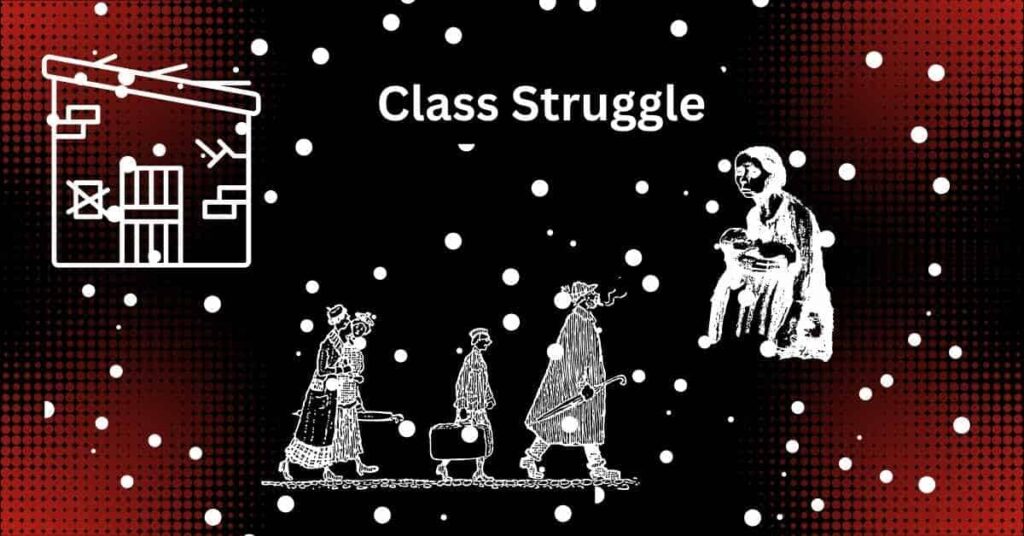
Class Struggle
When you hear someone bolster their class, it is a Marxist tactic promoting division. Class warfare keeps people separated. They see no hope in their situation.
If they’re stuck in a job with no upward mobility, their attitude keeps them there- not some invisible boogie man.
Marx believed capitalists keep everyone dumb and stupid for a reason. It helps the capitalists exploit and alienate the workers for maximum profit.
Marxists loathe profit.
Apparently, capitalism involves coercion forcing workers to obey orders. And they live in misery. In short, capitalism is a system of oppression alienating all the workers.
Also, a theory called surplus value helps explain this alienation and class struggle.
Surplus value is when capitalists control the modes of production. The workers produce more value in the product than they’re paid via wages. As a result, capitalists sell the surplus product for a profit. This profit the capitalists receive is worker exploitation.
Surplus Value Definition
For instance, let’s say you work at a pastry company making $15 per hour. In your 8-hour workday, you’ll earn $120. Yet, a company knows they can sell the pastries you produced for $150. The pastry company earns $30 profit off of your labor.
Marx sees this extra profit as exploitation. You’re not an individual earning an income for your family. You’re a victim of a Ponzi scheme taking advantage of you. There is no mutually beneficial relationship.
Thus, you’re part of the exploited workers’ class. You deserve retribution.
A way to achieve revenge and equality is to abolish the bourgeoises’ private property. Marxists see property as a way to manipulate workers. Yes, they want to press the “delete” key and abolish property deeds.
To rid of this system, a classless society needs to develop. They must overthrow the existing structure.
What should go?
- bourgeois
- material wealth
- any history or documents acknowledging this system
One of the most important goals rarely discussed is eradicating history.
In our current America, they want to eliminate the U.S. Constitution. It promotes individualism. Like I’ve said many times, class struggle is all about keeping people separated from each other. You can’t have documents promoting individual rights and thinking on your own.
This goes against Marxists’ philosophy of alienation and victimhood.
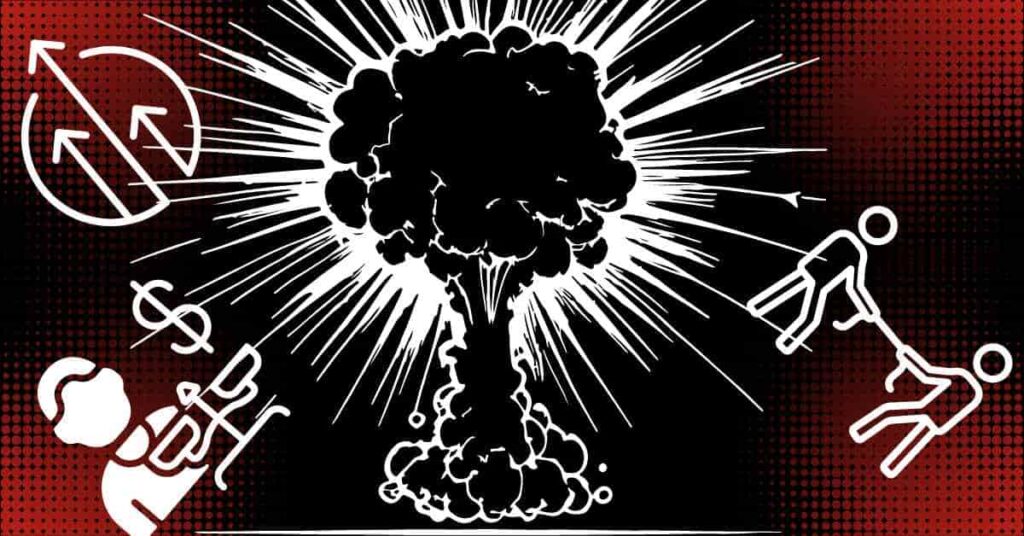
Nuking Economic Individualism
Marx’s class struggle aligned itself to destroy economic individualism.
Their economic goals are simple:
- abolition of private property
- elimination of competition
- eradication of banking institutions
Abolition of Private Property
You enjoy private property unless you want to live in a Marxist world. Our Founders designed the United States to secure property. It allows for your individual liberty.
When Marx discusses abolishing it, he doesn’t want your dental floss or toothbrush. He wants to nationalize and destroy the way factories operate. He wants:
- land
- ownership of the factory
- working class to be in charge
According to Marx, private property is a symbol of the class struggle. It is a result of alienated labor. And human economic minds designed it to keep people apart.
When Marx wrote this, he looked at the common land Englanders once possessed. The common land disappeared. The government privatized it by making people move to crowded cities where they fought for jobs.
However, he failed to state farming communal land gave rise to factions. People still competed for the best corner plot.
The best way to characterize Marx’s view on property is below:
“…hierarchical structure of landownership, and the armed bodies of retainers associated with it, gave the nobility power over the serfs.”
Karl Marx- The German Ideology
Marx ultimately thought that private property kept people from being together. Owning your piece of heaven is the opposite of communal living.
If you look at 1960s hippie-era communes, they instituted collective property. These are great modern case studies of Marxist thought.
They work well until it doesn’t. In other words, problems arise that are never solved breaking up the commune.
Here is a list of problems communal lands have:
- jealousy
- envy
- disagreements about who is in control
- making people do their assigned roles
Individuals need private property to keep independence. There is no sovereignty in communes run by utopians.
Have you ever wondered what is Marx’s political opponent? They exist. LEARN MORE by reading my article on Karl Marx’s opposite.
Elimination of Competition
In a Marxist world, competition keeps people in a frenzy. Everyone searches for the newest, freshest gadget. It helps promote the Marxist theory of historical materialism.
Do you want the new iPhone? Why do you want it?
Marx would say you’re nothing but a materialist for desiring it.
You yearn for it because you think it is cool. That’s fine. In a capitalist society, you have the fortitude to decide your own needs.
If you’re in the “Dictatorship of the Proletariat”, Marxists would confiscate your phone. Calling and texting people promotes competition.
In a Marxist world, all competition is bad. Remember, you’re part of a class incapable of independent thought. He doesn’t want you to communicate freely.
“By universal competition it forced all individuals to strain their energy to the utmost.”
Karl Marx- The German Ideology
To them, you can’t reach your true individuality until you submit yourself to the mob.
Moreover, going against Marx, competition brings economic innovation. It provides you with the goals and purpose to strive for the life you want.
You will never eliminate competition. It is part of human nature.
A core principle of economic individualism is competition. Vilifying competition erases history and your individuality.
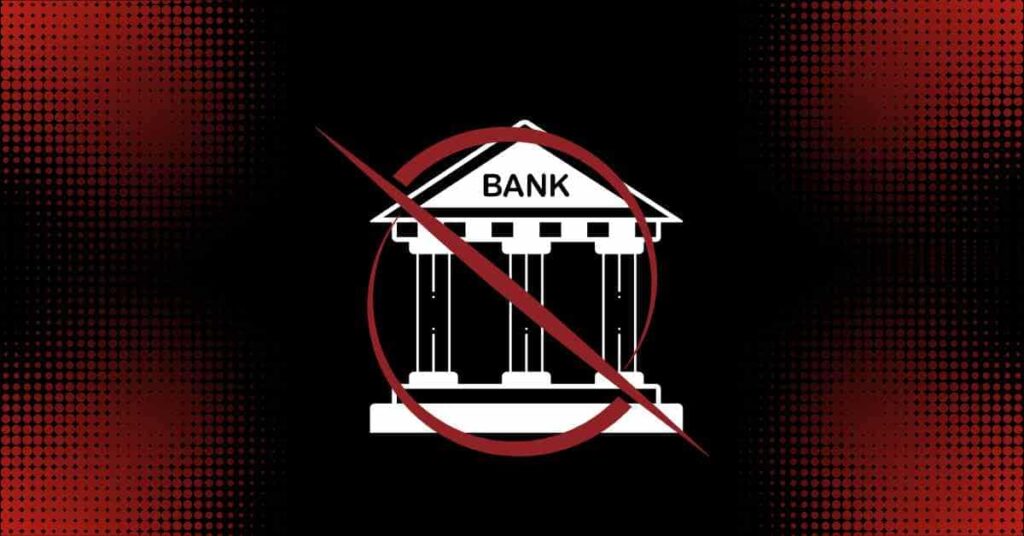
Destruction of the Banks
What do the banks control? We all know the answer. They manage the money supply.
But they also loan out capital to start a business or buy property.
Destroying the capital means capitalists can’t exploit the workers. Marx wants the banks abolished.
No banks equal no economic freedom. Without financial services, you become a government slave.
Conclusion
Marx is a famous revolutionary whose ideas threaten liberty and individualist principles. All his main points revolve around class, state control, and utopian political freedom.
He always pushes the individual to the back of the line. His “dictatorship of the proletariat” should scare you. That’s the stage toward communism every country that’s tried it stays. The dictator never leaves. Think North Korea, Cuba, or Venezuela. He failed human nature 101.
Yet, the Founding Fathers accounted for human nature. They instituted constitutional protections like separation of powers. It is hard for an absolute dictator to consolidate power in the U.S.
As we continue, capitalism is a voluntary system of exchanging goods and services. A socialist government uses coercion to force unnecessary actions on you.
Also, abolishing your private property is the first step toward eliminating individualism. Collective property is not treated with the same respect that property ownership provides.
In summary, many Marxists will try to persuade you to love this man. Don’t fall for his dystopian dreams. It won’t end well.
Ultimately, you’ll lose if his ideas win. Liberty’s embers will vanish and no hot coals will exist to restart the flame.
Have I convinced you to believe in liberty and NOT the modern Marxist movement? If I haven’t, send me a message. I will try another way.
J. Liberty
Marx’s ideas are summarized as collectivism. LEARN MORE as I describe subtle differences between the collective vs the individual.
References:
Bottommore, T., Harris, L., Kiernan, V., & Miliband, R. (1983). A Dictionary of Marxist Thought. Oxford: Blackwell Publishers.
Coby, J. P. (1986). The Utopian Vision of Karl Marx. Modern Age, 30(1), 22.
Gioia, V. (2019). Individualism and Social Change. An Unexpected Theoretical Dilemma in Marxian Analysis. Journal of Interdisciplinary History of Ideas, 8(16).
Marx, K., & Engels, F. (2005. First English Edition 1888). The Communist Manifesto and Other Writings. In K. Marx, The Communist Manifesto and Other Writings (pp. 7-41). New York: Barnes and Nobles Classics.
Marx, K., & Engels, F. (1970). The German Ideology Part 1. Great Britain: Lawrence & Wishart.
Sayers, S. (2007). Individual and Society in Marx and Hegel: Beyond the Communitarian Critique of Liberalism. Science & Society, 71(1), 84-102.
Staff. (2023). Fast Facts About Agriculture and Food. Retrieved from American Farm Bureau Federation .
Photo Credits
Photo Credits:
© Ekaterina79 via canva.com
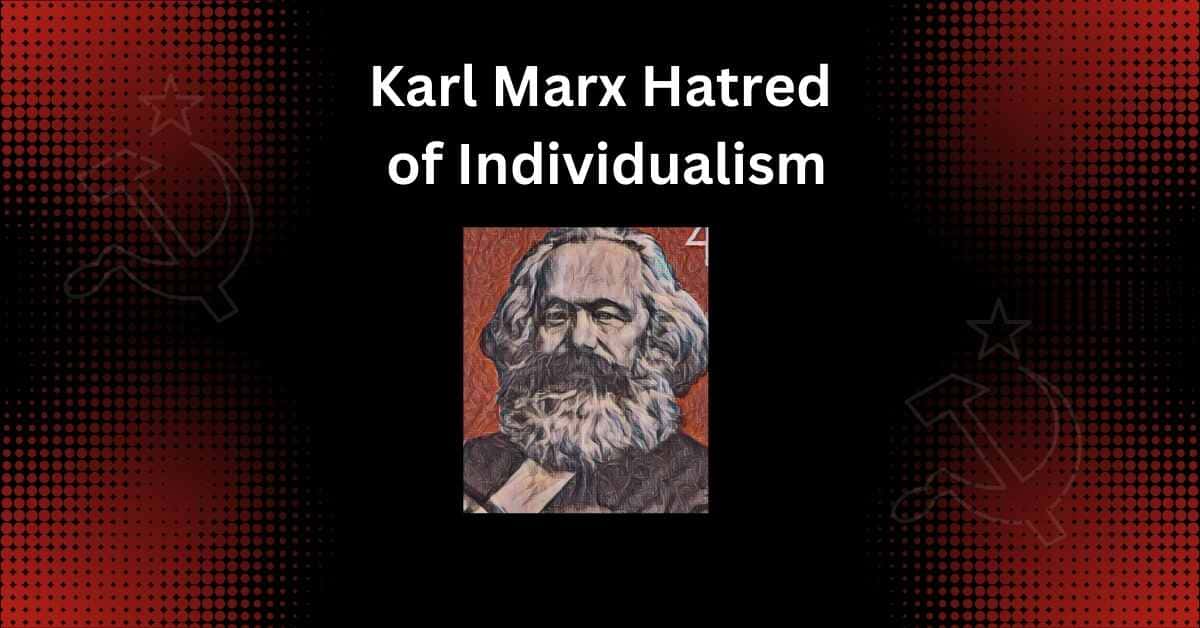

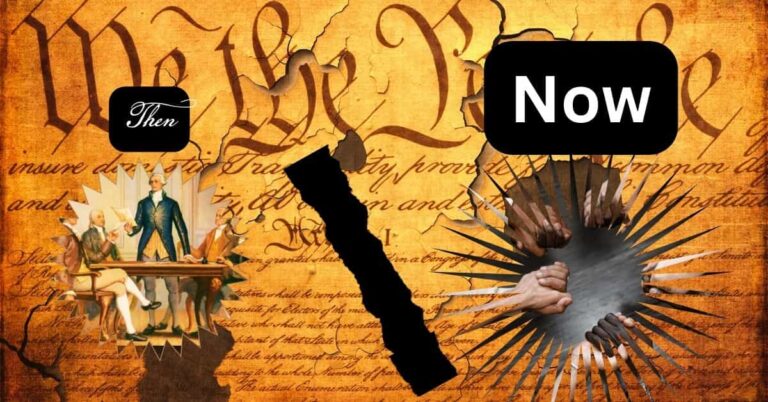
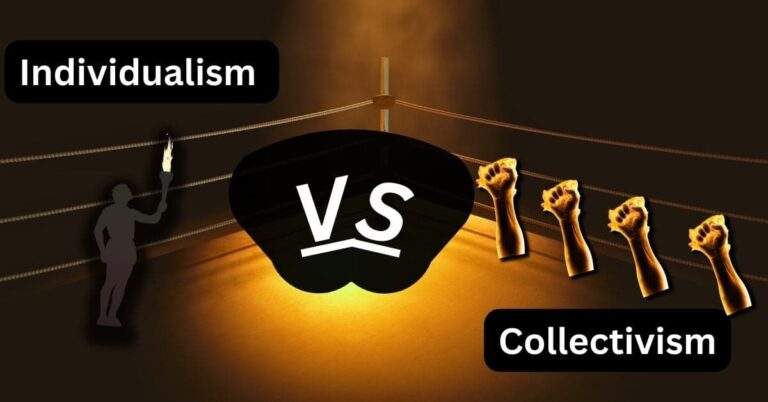
Leave a Comment